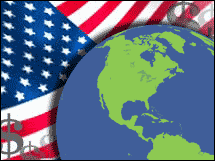|
U.S. workers need work? Go to El Salvador A new program will staff call centers in Central American nation with American workers. NEW YORK (CNNMoney.com) -- In order to meet the demands of companies outsourcing their call centers to El Salvador, the Central American country is beginning a program to recruit its employees from an unlikely location: the United States. The Salvadoran government's economic development organization has started a program called "Meet Your Roots" that "looks for children of Salvadorans born in the U.S. and Canada to reside and work temporarily in El Salvador in order to strengthen their identity and ties to the country," according to the organization's Web site.
While strengthening cultural ties, the Salvadoran who staffs call centers serving the U.S. market can earn up to $1,500 a month. Although the program was first announced this year, it is still in its early stages, according to the development organization, known by its Spanish acronym PROESA. Meetings have already been held in Los Angeles and Dallas to promote the program to Salvadoran communities there. Under the plan, PROESA finds prospective employees and puts companies in touch with them. The companies then offer the job to the Salvadoran-Americans over the phone, according to Karla Rivas of PROESA. PROESA and the Salvadoran government then take care of the details. The plan calls for participants to spend a year in El Salvador, Rivas said. So far parents of the high school graduates have been largely receptive. "They want their children to come to meet their roots," said Rivas. El Salvador boasts nine call centers operated by such companies as Spain-based Atento, Dell, GMC, Paris-based Teleperformance, and Sykes. Together they employ 4,700 people who each earn from $600 to $1,500 a month in a country where the minimum wage is about $150 a month. The Salvadoran government already operates a National English Center to boost the number of qualified bilingual employees and English is taught as a second language in El Salvador's schools, according to Rivas. Additionally, the country transitioned to the American dollar in 2002. El Salvador, which has one of the most deregulated economies of Central America 14 years after the end of a bloody civil war, is eager to grow its call center industry. "But the [call center] companies can't grow unless there are people to work in them," said Rivas, who estimates that currently only 3 percent of the people working in the nation's call centers are foreign born. Call centers makes sense as a strategy for small countries in need of export earnings, said Peter Rodriguez, economist at the University of Virginia explained. Rodriguez says that since the passage of the Central American Free Trade Agreement in 2005, some countries were doing "all they can to strengthen ties to the U.S." "These hybrid forms of interconnectedness are made possible through communication, technology and efficiencies of different technologies such as VOIP," according to Rodriguez. The program "leverages the Salvadoran diaspora," said Rodriguez. "This is new and intriguing." El Salvador has a domestic population of 6 million with another 2 million living abroad, 96 percent of them in the U.S. Not everyone is pleased with the prospects of the program, however. "It's bad enough that trade deals like CAFTA have shipped U.S. jobs overseas," Rep. Sherrod Brown (D-Ohio) said in an e-mail message. "Now they're siphoning promising young citizens off, too." But Rodriguez of the University of Virginia noted that "the economics of the industry are that you can put a call center anywhere." And Rivas of PROESA pointed with pride to the high ratings for customer service Salvadorans are known for. "[Salvadoran] people are kind," Rivas said. "They have a neutral accent when speaking English. And the government of El Salvador is very focused on foreign investment." --------------------------------- |
|

